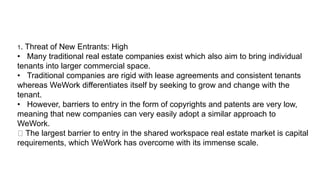
porter forces.pptx
- 1. 1. Threat of New Entrants: High • Many traditional real estate companies exist which also aim to bring individual tenants into larger commercial space. • Traditional companies are rigid with lease agreements and consistent tenants whereas WeWork differentiates itself by seeking to grow and change with the tenant. • However, barriers to entry in the form of copyrights and patents are very low, meaning that new companies can very easily adopt a similar approach to WeWork. The largest barrier to entry in the shared workspace real estate market is capital requirements, which WeWork has overcome with its immense scale.
- 2. 2. Bargaining Power of Customers: High • Many real estate substitutes are available, although they do not offer the supposed community culture WeWork brings with shared workspaces. • However, WeWork’s differentiation is contingent on the sharing of office space being perceived as added value in the eyes of the customer. • That being said, WeWork does have a first-mover advantage in this market and so for most customers will be considered the ‘go-to’ for these sorts of workspaces. • In an economic downturn WeWork are unable to back out of their leases, meaning that their reliance on regular tenants will remain high despite a potentially lower demand from customers.
- 3. 3. Bargaining Power of Suppliers: High • WeWork does not own its tangible assets (workspaces), the asset owner (supplier) has high power when it comes to rental prices and rules surrounding the use of the real estate. • WeWork obtains real estate using long-term contracts and leases it to tenants in the short-term. This long-term rental commitment is a liability that comes with significant risk. • The company has recently shifted towards longer more secure tenants, it is difficult to say whether this will be sufficient to carry them through a recession. • WeWork has contractually backed a fraction of their obligated payments to landlords by corporate and bank guarantee. Should WeWork be unable to find tenants during the economic downturn, a portion of their payments will be contractually obligated even if the company approaches bankruptcy.
- 4. 4. Threat of Substitutes: Moderate